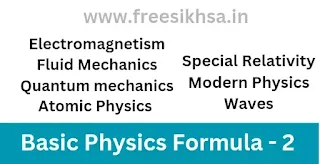Basic Physics Formula Part - 2
Electromagnetism:
✅ F = qE (force on a charged particle equals the charge times electric field strength)
✅ F = Bqv (force on a charged particle moving through a magnetic field equals magnetic field strength times charge times velocity)
✅ V = IR (Ohm's law - voltage equals current times resistance)
Fluid Mechanics:
✅ F = rho * g * V (buoyant force equals density times gravity times volume)
✅ P1 + 1/2 * rho * v1^2 + rho * g * h1 = P2 + 1/2 * rho * v2^2 + rho * g * h2 (Bernoulli's equation - pressure plus kinetic energy plus potential energy equals constant)
Atomic and Nuclear Physics:
✅ E = mc^2 (mass-energy equivalence - energy equals mass times the speed of light squared)
✅ lambda = h/p (de Broglie wavelength - wavelength equals Planck's constant divided by momentum)
✅ N = N0 * e^(-lambda*t) (radioactive decay - number of radioactive nuclei equals initial number times e to the negative decay constant times time)
Quantum Mechanics:
✅ E = hf (Planck-Einstein relation - energy of a photon equals Planck's constant times its frequency)
✅ p = h/lambda (de Broglie's equation - momentum equals Planck's constant divided by wavelength)
✅ HΨ = EΨ (Schrödinger's equation - the wave function Ψ of a system satisfies the time-independent Schrödinger's equation HΨ = EΨ, where H is the Hamiltonian operator and E is the energy of the system)
Electromagnetic Waves:
✅ c = f * lambda (speed of light equals frequency times wavelength)
✅ E = hc/lambda (energy of a photon equals Planck's constant times the speed of light divided by wavelength)
✅ B = E/c (magnetic field strength equals electric field strength divided by the speed of light)
Modern Physics:
✅ V = c^2 / sqrt(1-v^2/c^2) (relativistic velocity addition - velocity in one frame equals the velocity in another frame plus the velocity of the two frames divided by the speed of light squared)
✅ E = mc^2 + K (total energy of a particle equals its rest energy plus its kinetic energy)
✅ N = N0 * e^(-λt) (radioactive decay - number of radioactive nuclei equals the initial number times e to the negative decay constant times time)
Special Relativity:
✅ t' = t/sqrt(1-v^2/c^2) (time dilation - time in a moving frame equals time in a rest frame divided by the square root of 1 minus velocity squared over the speed of light squared)
✅ L = L0 * sqrt(1-v^2/c^2) (length contraction - length in a moving frame equals length in a rest frame times the square root of 1 minus velocity squared over the speed of light squared)
✅ E = gamma * mc^2 (relativistic energy - energy equals the rest mass times the speed of light squared times the gamma factor)
These are just a few more basic physics formulas. As you continue to study physics, you will encounter many more formulas that describe the behavior of the physical world around us


